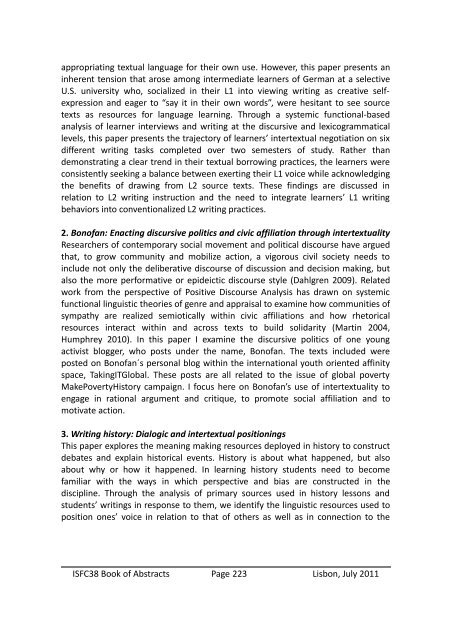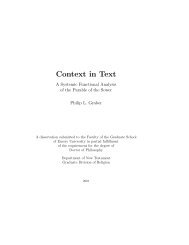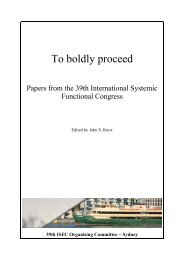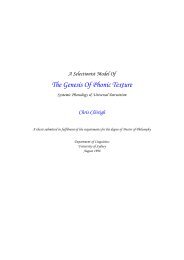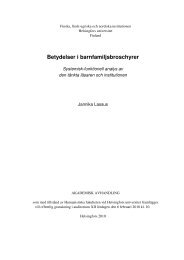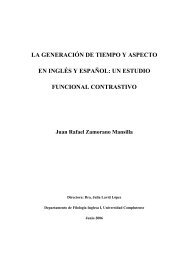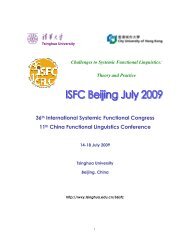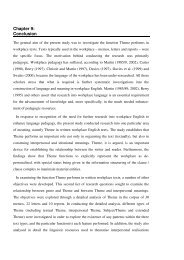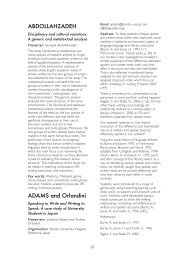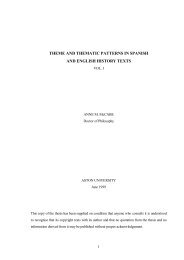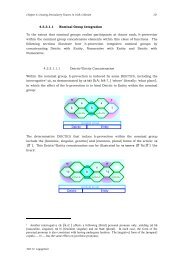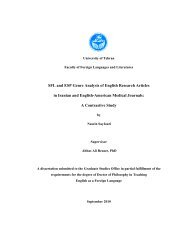Abstracts - Faculdade de Letras da Universidade de Lisboa
Abstracts - Faculdade de Letras da Universidade de Lisboa
Abstracts - Faculdade de Letras da Universidade de Lisboa
- No tags were found...
Create successful ePaper yourself
Turn your PDF publications into a flip-book with our unique Google optimized e-Paper software.
appropriating textual language for their own use. However, this paper presents aninherent tension that arose among intermediate learners of German at a selectiveU.S. university who, socialized in their L1 into viewing writing as creative selfexpressionand eager to “say it in their own words”, were hesitant to see sourcetexts as resources for language learning. Through a systemic functional-base<strong>da</strong>nalysis of learner interviews and writing at the discursive and lexicogrammaticallevels, this paper presents the trajectory of learners’ intertextual negotiation on sixdifferent writing tasks completed over two semesters of study. Rather than<strong>de</strong>monstrating a clear trend in their textual borrowing practices, the learners wereconsistently seeking a balance between exerting their L1 voice while acknowledgingthe benefits of drawing from L2 source texts. These findings are discussed inrelation to L2 writing instruction and the need to integrate learners’ L1 writingbehaviors into conventionalized L2 writing practices.2. Bonofan: Enacting discursive politics and civic affiliation through intertextualityResearchers of contemporary social movement and political discourse have arguedthat, to grow community and mobilize action, a vigorous civil society needs toinclu<strong>de</strong> not only the <strong>de</strong>liberative discourse of discussion and <strong>de</strong>cision making, butalso the more performative or epi<strong>de</strong>ictic discourse style (Dahlgren 2009). Relatedwork from the perspective of Positive Discourse Analysis has drawn on systemicfunctional linguistic theories of genre and appraisal to examine how communities ofsympathy are realized semiotically within civic affiliations and how rhetoricalresources interact within and across texts to build soli<strong>da</strong>rity (Martin 2004,Humphrey 2010). In this paper I examine the discursive politics of one youngactivist blogger, who posts un<strong>de</strong>r the name, Bonofan. The texts inclu<strong>de</strong>d wereposted on Bonofan´s personal blog within the international youth oriented affinityspace, TakingITGlobal. These posts are all related to the issue of global povertyMakePovertyHistory campaign. I focus here on Bonofan’s use of intertextuality toengage in rational argument and critique, to promote social affiliation and tomotivate action.3. Writing history: Dialogic and intertextual positioningsThis paper explores the meaning making resources <strong>de</strong>ployed in history to construct<strong>de</strong>bates and explain historical events. History is about what happened, but alsoabout why or how it happened. In learning history stu<strong>de</strong>nts need to becomefamiliar with the ways in which perspective and bias are constructed in thediscipline. Through the analysis of primary sources used in history lessons andstu<strong>de</strong>nts’ writings in response to them, we i<strong>de</strong>ntify the linguistic resources used toposition ones’ voice in relation to that of others as well as in connection to theISFC38 Book of <strong>Abstracts</strong> Page 223 Lisbon, July 2011


